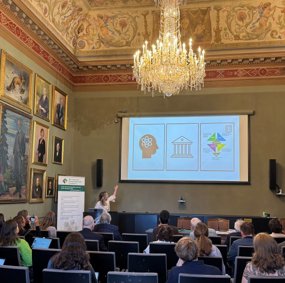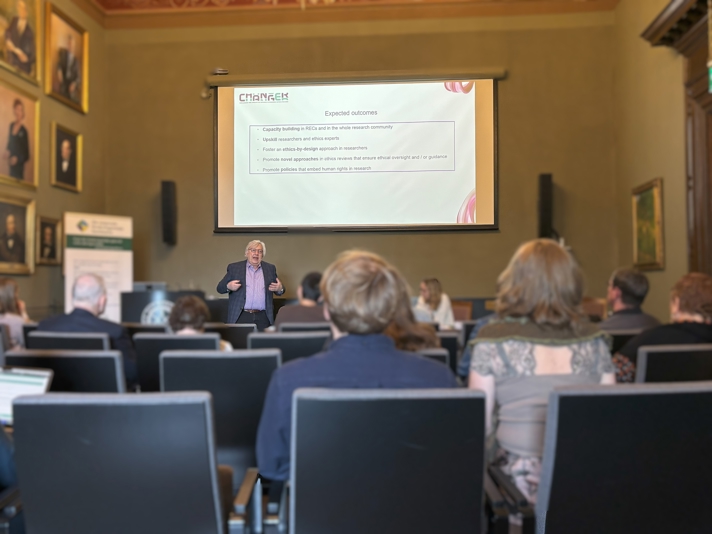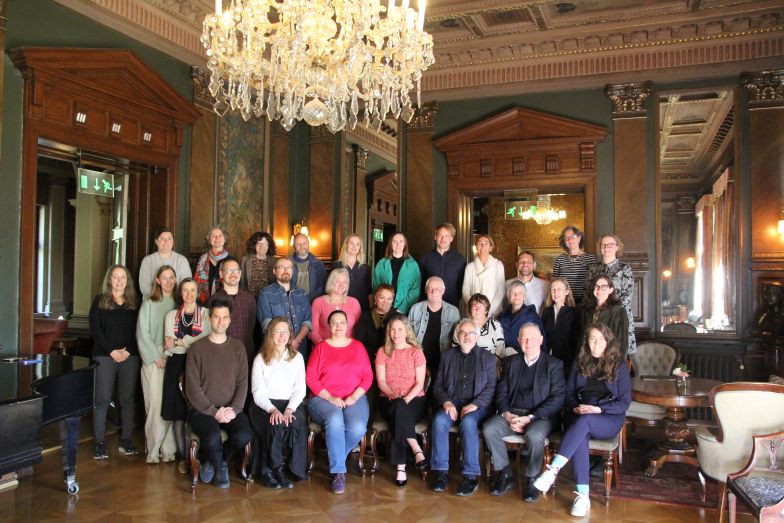ENRIO Oslo meeting: AI in research and General assembly
AI was one of the topics on top of the agenda when representatives from The European Network of Research Integrity Offices (ENRIO) met for their spring meeting in Oslo.

“For us at the National Research Ethics Committees (NREC), ENRIO represents an important opportunity to engage in the most significant European collaboration on research integrity”, said Helene Ingierd, director of NREC, when opening the spring meeting on April 24.
Almost 40 representatives from all across Europe had gathered to discuss relevant topics and the future of the organization. Others participated digitally.
Ingierd emphasized the importance of research integrity in the turbulent times we live in.
“The campaign against science by the Trump administration is also a campaign against the core principles of research integrity. It clearly demonstrates the need for us to stand up for values such as independence, openness, and reliability. The work we do—both in our own countries and through ENRIO — is more important than ever”, she said.
Change for the better
The ENRIO President, Oldřich Tůma, summed up the development of ENRIO:
"My personal impression is that the board meetings are much more systematic than previously. We will soon have a full-time secretary. The website is more professional."
He called it “change for the better” and wished all participants a productive meeting and gave the floor to the general secretary of The Norwegian Academy of Science and Letters (DNVA), professor Marit Westergaard (UiT The Arctic University of Norway). She welcomed everyone to their beautiful house, built as a private home in 1887 and taken over by the Academy in 1911.
Westergaard explained that DNVA does a lot of different work on research ethics and integrity (RE/RI) and has its own research ethics committee that has raised different RE/RI topics, such as use of health data, open access and the handling of misconduct.
“The committee has also established ethical guidelines for the scientific prizes that the Academy is responsible for, first and foremost the Abel Prize and the Kavli Prize”, explained Westergaard.
Professor Ole-Andreas Rognstad spoke as a member of the DNVA RE-committee. He explained that the committee is ready to act in cases where members of the academy are involved in cases concerning scientific misconduct.
“These cases are handled at the institutions firstly, but the academy can suggest follow ups and we have guidelines for the handling.”
He underlined that the committee works with RE at large, not only on cases concerning scientific misconduct.
“We bring public attention to RE questions and organize meetings where RE is on the agenda. We also give input to the parliament on the national system, not least regarding the quality of research, including the importance of academic freedom, which seems quite crucial these days”, said Rognstad.
The Norwegian way
NREC-director Helene Ingierd gave an introduction to the Norwegian system of RE/RI. She shared the NREC vision with the audience: “We elevate Research Ethics and Research Integrity.”
“On the one hand, we have a research ethics act which allocates responsibility within the research institutions and to other actors involved in research. On the other hand, the act says that all research must be done in accordance with recognized research ethical norms. These are formulated by the scientific community itself, through the members of our committees. There is as strong tradition for self-regulation”, said Ingierd.
After establishing regional medical committees in 1985, the Norwegian parliament discussed the need to establish committees on other fields of expertise. The three national committees NEM (medical and health), NENT (natural sciences and technology) and NESH (social sciences and humanities) were established in 1990. From the very start, they were professionally independent. With the first RE-act in 2006, the commission for the investigation of research misconduct (GRU) was established, following a severe and much debated misconduct case. After controversies regarding the use of Sami human remains particularly, the human remains committee (SKJ) was established in 2008.
The different entities within NREC work slightly differently and within different frameworks, but they all provide guidance, they give statements or decisions. Giving guidelines is also a key task for most of them. NREC provides a variety of resources on RE/RI for students, researchers, institutions and the general public, such as the Research Ethics Library, articles on specific topics, reports and anthologies, and The Research Ethics Magazine.
How to deal with AI
Two speakers addressed the main topic of the day - how to facilitates ethically good and responsible AI-research. Hallvard Fossheim, Chair of the National Committee for Research Ethics in Science and Technology (NENT) and Professor in Philosophy, University of Bergen spoke on exceptionalism about AI. He stressed that he spoke on his own behalf, not on the behalf of his committee.
“Exceptionalism means that you treat one thing differently from other things because it is so unique. I don’t think we should go in for exceptionalism about AI,” he said.
He showed how the principles we already have in science are still valid with AI research, though they might need to be interpreted anew.
Fossheim did not speak in favour of pre-approval.
“There are good reasons for not having pre-approval in most areas. It is important to avoid alienation and keep RE discussions where they belong: with the researchers,” he claimed.
This calls for more and correct education, said Fossheim.
“Education is important. I have given many courses on doctoral and masters level where we go through guidelines and principles. The result? The students simply don’t get it, because it doesn’t mean anything to them yet. There must be a link between the experience of the student and the actual challenge. One way to do it, is to discuss real or fictional cases. This is more resource demanding than the general lecture, but it might make them remember how to apply this down the road. Another way to do it is to try to make some kind of relations between juniors and the actual research projects going on at the institutions. Have them discuss actual ethical challenges and give them feedback”, Fossheim suggested.
Matthias Kaiser, Professor emeritus, University of Bergen, spoke as a member of the CHANGER project. It stands for Challenges and innovative changes in research ethics reviews and one of the aims is to develop a new ethics assessment tool focused on AI research aimed at researchers and Research Ethics Committees (RECs), and a benchmarking tool for RECs to assess their capacity to review AI research.
Kaiser raised the concern of reduced control over projects and outcomes:
“AI long-term development in any socially- and policy-relevant field contributes to increased complexity and lack of predictability and reduced controllability of outcomes. In terms of values, it will often cross lines which are problematic for some but not necessarily all. How can we then assess problematic ethical issues in this research?”
One of the tools they are looking to develop further in the CHANGER project, is Narrative ethics scenario building. This step-by-step method starts by mapping relevant values of partners and users, agreeing on a problem formulation for the research, mapping actors, interactions and functions and more. Finally, you characterize future scenarios and assign values to each scenario. This can lead you to the least problematic one.
“We want to place this in the research community, the ethical reflection should be an ongoing process”, Kaiser said.

He also reminded the assembly that this is not the first time technologies have changed science.
“Whenever we have a new revolutionary technology, we are going to lose some skills. We must reflect on who is in charge, how much control do they have. In the case of AI and how it is used today: Can we afford to lose critical thinking? No. This is something we need to maintain.”
The participants discussed how ENRIO might contribute.. It was stated that ENRIO should contribute with an overview of what has been done in the different European countries so far. Other activities in this domain should be aligned with the ongoing work on the new strategy.
Working groups and strategy
Later, different working groups in ENRIO presented their latest progress. These are working on RE in Social sciences and humanities, on communications in ENRIO and on key definitions concerning RE/RI.
ENRIO is also working on a new strategy, and a separate session was dedicated to this work.
The meeting in the General Assembly took place on the final day of the meeting.
